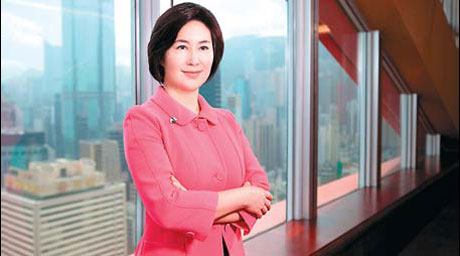Pansy Ho reveals her vision for Macao's transformation
 |
|
The daughter of casino magnate Stanley Ho, Pansy Ho is a major mover in Macao's tourism industry. Provided to China Daily |
The Global Tourism Economy Forum (GTEF) will take place in Macao from Sept 9 to 11, and one of the major issues tabled for discussion may be the host city's transition from China's only gambling enclave to the nation's leisure and tourism hub.
At least, that is definitely on the agenda of Pansy Ho, who is a major mover in the special administrative region's tourism industry.
"It's not because we can't grow the gaming industry," says Pansy Ho on the sidelines of the forum's launch ceremony. "But we know, with far-sighted vision, that we want Macao to become more than that. If we don't want Macao's growth to eventually find itself at a stalemate, we need to start thinking quickly on how Macao can continue its impetus."
Ho is the daughter of casino magnate Stanley Ho, who almost single-handedly created Macao's reputation as the "Las Vegas of the East". She is also vice-chairman and secretary-general of GTEF.
Currently, Macao is the world leader in gaming revenue, with a total of $34 billion in 2011, nearly six times the $6.1 billion revenue of the Las Vegas Strip.
Strong regional demand drives the gaming industry, spearheaded by its top feeder market, the Chinese mainland, according to a newly published quarterly report by HVS, a global consulting and services organization with the focus on gaming and leisure industries.
The report says more than 4.4 million mainland Chinese visitors visited Macao in the last quarter of 2011, the highest number ever.
Joao Manuel Costa Antunes, director of the city government tourism office, said in an interview with Bloomberg, that Macao's tourist arrivals will increase at least 10 percent this year from 2011's 28 million, led by visitors from the Chinese mainland.
But there are signs of an approaching storm. Although the report says Macao's gaming industry will "remain unrivaled for the foreseeable future", the competition from Singapore, Vietnam, the Philippines and relatively more distant Australia is intense.
These markets, too, are looking at attracting big-spenders from China.
That is the reason Ho thinks Macao must look ahead and plan forward. Her vision dovetails into China's 12th Five-Year Plan for National Economic and Social Development, where Macao Special Administrative Region is to be positioned as a world center of tourism and leisure.
Macao is the only place in China where gaming is legal, although there are restrictions for its citizens. Non-Macao residents are only allowed to visit once every three months and Chinese civil servants are not allowed in Macao casinos.
However, these restrictions do not apply when individual mainland Chinese travelers visit Singapore and other Southeast Asian countries.
"The fact that fierce competition has begun to reduce Macao's average gaming revenue per guest indicates there is a point of saturation in the gaming industry. It compels Macao to diversify its economy and develop other attractions," says Shi Guang, researcher at Office for Taiwan, Hong Kong and Macao Affairs of China Academy of Social Sciences.
Ho thinks the prospects are good.
The city is compact, featuring cobblestoned lanes, colonial mansions, art deco buildings and tranquil parks, all done in a fusion of Chinese and Portuguese cultural motifs.
Although the former sleepy fishing port preserves its historic heritage well and has them listed by UNESCO, it is overshadowed by many mainland tourist destinations in terms of natural wonders and cultural treasures.
"Macao intends to cater for tourists by re-inventing itself," Ho says.
Like Vegas, Macao has attractive recreation options, including Cirque du Soleil's ZAIA show, the theatrical acrobatics and dancing extravaganza House of Dancing Water and concerts by musical celebrities such as Beyonce.
Infrastructure updates will also push Macao into the forefront. The ambitious Hong Kong-Zhuhai-Macao Bridge will be ready in less than five years, and "a rail network will also be added, bringing the traveling distance between Macao and Guangzhou to less than one hour", Ho says.
She says Macao is positioned to be a transit hub connecting China to Southeast Asia, adding: "Within the short span of 13 years since Macao returned to China, all these infrastructure projects are being put in place."
Zhang He, deputy general manager of Beijing Youth Travel Service, says Macao, as a geographic hub, will have more stopover and cross-boundary travelers, which will add to the considerable number of tourist arrivals to Macao.
But Ho says Macao needs to tackle the transformation gradually and she knows it will not take place in the immediate future.
lijing2009@chinadaily.com.cn
















